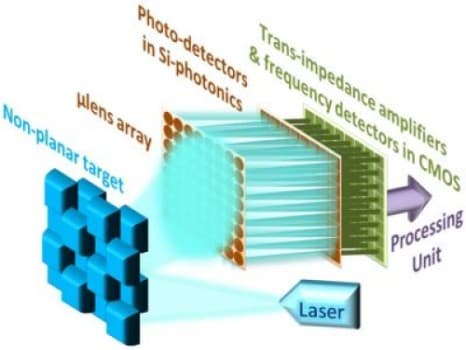Self-Driving Cars And 3-D Video Games To Benefit From New Laser Sensing Tech
University of California, Berkeley researchers have developed a first of its kind laser sensing technology which is able to remotely sense objects that are 30 feet away (that is 10 times the distance covered by any laser systems in use today). The amazing new twist given to the 3D imaging technology can give a boost to a number of new applications ranging from smartphones to 3D video games and even self-driving cars (Is Google listening?). The researchers believe that this technology has the potential to enable self-driving cars to spot a roadblock or a child in its way from half a block away OR it could let you answer your smartphone from across the room with just a wave of your hand. The application in 3D video games is amazing too. We can envision a future where we play a game of "virtual tennis" right in front of the house.
The brilliance of this technology lies in the fact that we don't need huge or bulky equipment or electronics or optics to achieve all that. Based on LIDAR or LIght RADar system, this new 3D imaging technology provides feedback to its surrounding using light emitting from a laser. The researchers tried to lessen the power consumption and shrink the size of these LIDAR based system without hampering performance. The frequency-modulated continuous-wave (FMCW) LIDAR system emits “frequency-chirped†laser light on an object and then measures changes in the light frequency that is reflected back.

Source: #-Link-Snipped-#
The brilliance of this technology lies in the fact that we don't need huge or bulky equipment or electronics or optics to achieve all that. Based on LIDAR or LIght RADar system, this new 3D imaging technology provides feedback to its surrounding using light emitting from a laser. The researchers tried to lessen the power consumption and shrink the size of these LIDAR based system without hampering performance. The frequency-modulated continuous-wave (FMCW) LIDAR system emits “frequency-chirped†laser light on an object and then measures changes in the light frequency that is reflected back.

The researchers from Berkeley made use of a class of lasers called MEMS tunable VCSELs. The MEMS help in changing the frequency of the laser light, whereas the VCSELs (vertical-cavity surface-emitting lasers) become the low-cost integrable semiconductor lasers that consumer very less power. The researchers were successful in amplifying the system’s signal without the need of a large amount of power.
The team is now looking forward to integrating the VCSEL, photonics and electronics on a chip. That would mean wide applications of this technology right from car control systems to the tablet in our homes. What are your thoughts on this research work? Share with us in comments below.
The team is now looking forward to integrating the VCSEL, photonics and electronics on a chip. That would mean wide applications of this technology right from car control systems to the tablet in our homes. What are your thoughts on this research work? Share with us in comments below.
Source: #-Link-Snipped-#
0
